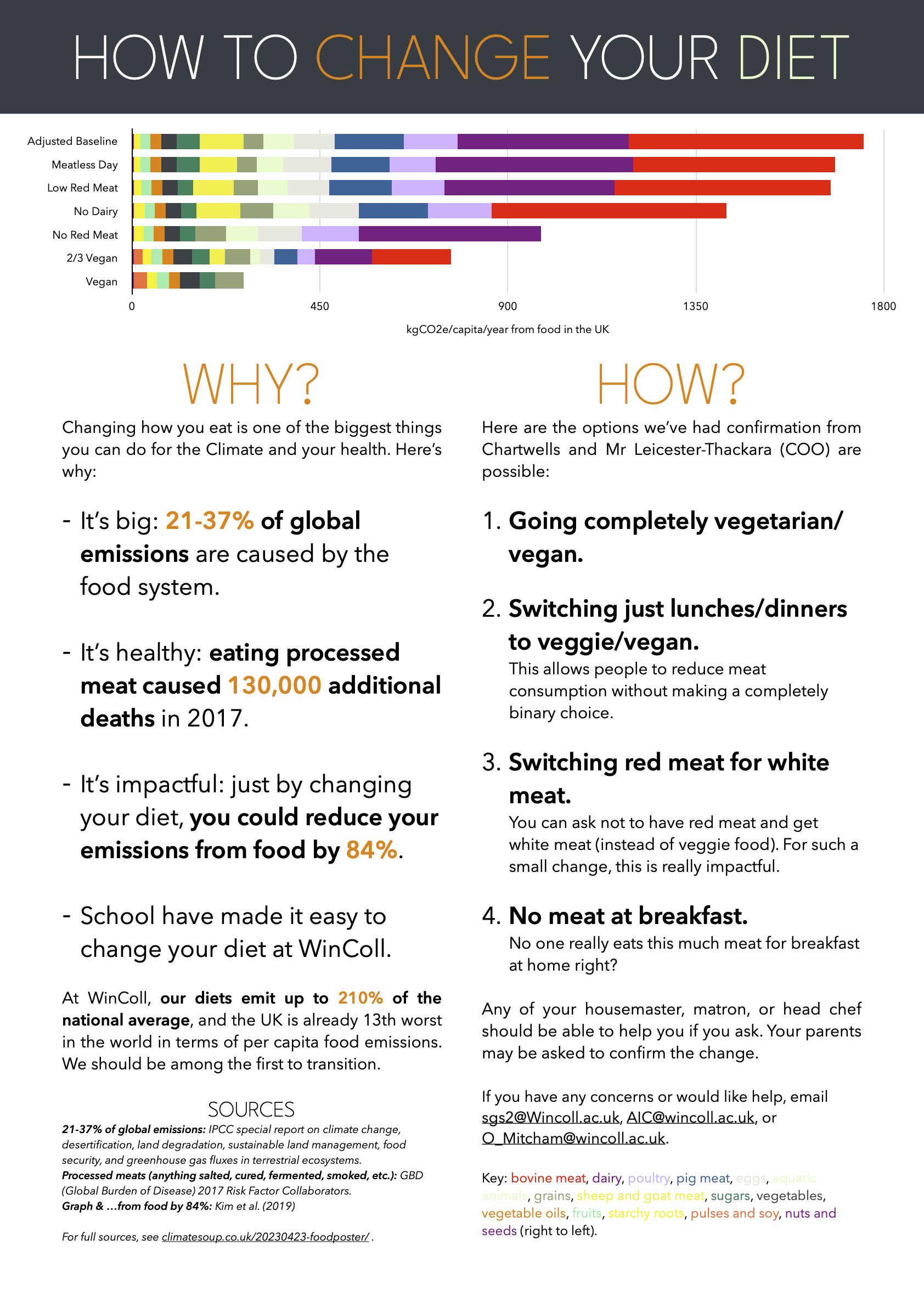I made a poster that’s now up around the school (or will be soon, depending on when you read this):

WHY?
Changing how you eat is one of the biggest things you can do for the Climate and your health. Here’s why:
- It’s big: 21-37% of global emissions are caused by the food system.1
- It’s healthy: eating processed meat caused 130,000 additional deaths in 2017.2
- It’s impactful: just by changing your diet, you could reduce your emissions from food by 84%.3
- School have made it easy to change your diet at WinColl.
At WinColl, our diets emit up to 210% of the national average4, and the UK is already 13th worst in the world in terms of per capita food emissions. We should be among the first to transition.
Feb 2024 Update: the leaflet version of this poster uses data attributing 900,000 deaths in 2019 to red meat consumption.5 It also references that our diets alone will blow through our carbon budget for 1.5C and most of our budget for 2C.6
HOW?
Here are the options we’ve had confirmation from Chartwells and Mr Leicester-Thackara (COO) are possible:
- Going completely vegetarian/vegan.
Going completely vegan would have maximum impact, and veggie would be significant too. - Switching just lunches/dinners to veggie/vegan.
You can change just some of your meals to veggie/vegan by picking just lunches/dinners. - Switching red meat for white meat.
You can ask not to have red meat and get white meat (instead of veggie food). For such a small change, this is really impactful. - No meat at breakfast.
No one really eats this much meat for breakfast at home right?
Any of your housemaster, matron, or head chef should be able to help you if you ask. Your parents may be asked to confirm the change.
If you have any concerns or would like help, email SGS2@wincoll.ac.uk, AIC@wincoll.ac.uk, or O_Mitcham@wincoll.ac.uk.
-
Mbow, C., C. Rosenzweig, L.G. Barioni, T.G. Benton, M. Herrero, M. Krishnapillai, E. Liwenga, P. Pradhan, M.G. Rivera-Ferre, T. Sapkota, F.N. Tubiello, Y. Xu, 2019: Food Security. In: Climate Change and Land: an IPCC special report on climate change, desertification, land degradation, sustainable land management, food security, and greenhouse gas fluxes in terrestrial ecosystems [P.R. Shukla, J. Skea, E. Calvo Buendia, V. Masson-Delmotte, H.-O. Pörtner, D.C. Roberts, P. Zhai, R. Slade, S. Connors, R. van Diemen, M. Ferrat, E. Haughey, S. Luz, S. Neogi, M. Pathak, J. Petzold, J. Portugal Pereira, P. Vyas, E. Huntley, K. Kissick, M. Belkacemi, J. Malley, (eds.)]. In press. ↩
-
GBD 2017 Risk Factor Collaborators. Global, regional, and national comparative risk assessment of 84 behavioural, environmental and occupational, and metabolic risks or clusters of risks for 195 countries and territories, 1990-2017: a systematic analysis for the Global Burden of Disease Study 2017. Lancet. 2018;392(10159):1923-94. ↩
-
Kim, Brent; Santo, Raychel; Scatterday, Allysan; Fry, Jillian; Synk, Colleen; Cebron, Shannon; Mekonnen, Mesfin; Hoekstra, Arjen; de Pee, Saskia; Bloem, Martin; Neff, Roni; Nachman, Keeve (2019), “Data for: Country-specific dietary shifts to mitigate climate and water crises”, Mendeley Data, V3, doi: 10.17632/g8n8w8snmj.3 ↩
-
UK national average is 2.0 tCO2 eq/capita/year which is 1.4 tCO2 eq/capita/38 weeks. We estimate that Wykehamists emit 2.4-3.1 tCO2 eq/capita/38 weeks (when we’re at school) which is ~165-210% of the national average. ↩
-
Institute for Health Metrics and Evaluation (IHME). GBD Compare Data Visualization. Seattle, WA: IHME, University of Washington, 2020. Available from http://vizhub.healthdata.org/gbd-compare. (Accessed January 2024) ↩
-
Clark, Michael A., Nina GG Domingo, Kimberly Colgan, Sumil K. Thakrar, David Tilman, John Lynch, Inês L. Azevedo, and Jason D. Hill. “Global food system emissions could preclude achieving the 1.5° and 2° C climate change targets.” Science, 370, no. 6517 (2020): 705-708. Available at: https://ourworldindata.org/environmental-impacts-of-food?insight=food-emissions-climate-targets#key-insights-on-the-environmental-impacts-of-food. ↩